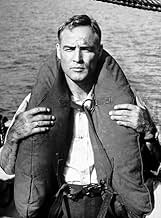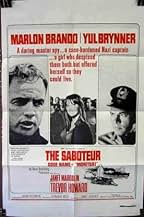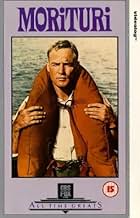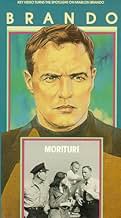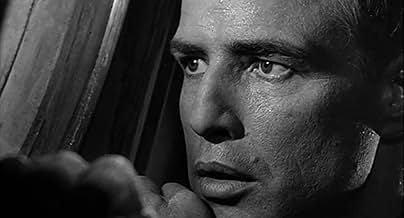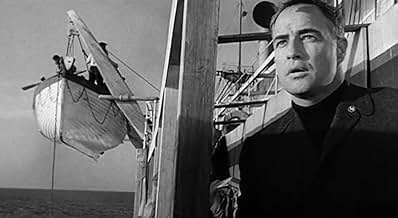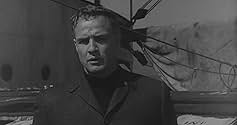AVALIAÇÃO DA IMDb
7,0/10
4,7 mil
SUA AVALIAÇÃO
Um pacifista de guerra é chantageado para se passar por oficial da SS e desativar os explosivos de afundamento do cargueiro que transporta uma carga de borracha, para que sejam capturados pe... Ler tudoUm pacifista de guerra é chantageado para se passar por oficial da SS e desativar os explosivos de afundamento do cargueiro que transporta uma carga de borracha, para que sejam capturados pelos Aliados.Um pacifista de guerra é chantageado para se passar por oficial da SS e desativar os explosivos de afundamento do cargueiro que transporta uma carga de borracha, para que sejam capturados pelos Aliados.
- Direção
- Roteiristas
- Artistas
- Indicado a 2 Oscars
- 2 indicações no total
Oscar Beregi Jr.
- Admiral
- (as Oscar Beregi)
- Direção
- Roteiristas
- Elenco e equipe completos
- Produção, bilheteria e muito mais no IMDbPro
Avaliações em destaque
An interesting and rather dark war story that takes place aboard a German merchant vessel during WWII. The black and white filming adds to the generally drab and realistic ambiance of the ocean crossing. Marlon Brando's expatriate is trapped into a scheme of espionage/sabotage, and his grim, softly sneering coolness gives the character of Robert Crain an added dimension. Yul Brynner plays the captain of the ship, out of favor with the Nazi party and under surveillance, yet still "pragmatically patriotic" to the Fatherland. Brynner is an oft-underrated actor because of the larger-than-life roles he played, but this film better showcases the subtlety he was capable of, and at times his performance excels. This is a complex and tense war movie that views both sides through a curtain of ugliness, yet captures moments of honor and loyalty and even kindness, a facet that other war movies in this genre often lack. The realism of the shipboard action is crucial--you could get a flutter of seasickness just watching--and all of the characters show depth and detail. No spoilers here; try to find this flick at the video store and watch it a couple of times. It's worth the search.
One of the many things this great (but at the time overlooked) movie did was to indirectly dispel some of the mislaid blame laid on Brando for the excesses of "Mutiny on the Bounty". Here he is again working with Trevor Howard (Bligh in "Mutiny")whom the press said loathed Brando (although Howard himself came to Brando's defense during the "Mutiny" blame game. Also, here is Brando again working with Aaron Rosenburg (also from "Mutiny") whom the press clippings claimed would never work with Brando again. By all accounts, all associated with Morituri got along famously and were all on their best professional behavior. This is one of Marlon's better works during the 1960's and it is sad that the Critic's were so eager to pounce upon it. It is one of those rare films that has grown better with age. Thankfully it is out now on DVD and given the treatment it deserves.
In 1942 Japan, the Germans are desperate to open the shipping lanes between Japan and Germany. German Captain Mueller (Yul Brynner) is still being blamed for having a drink before getting torpedoed in his last assignment. He is bitter at his son's treatment by the military brass. There is a shortage of manpower and Mueller is forced to take on prisoners pressed into service. He is transporting a valuable load of rubber destine to supply the German war machine for three full months. In India, German deserter Robert Crain (Marlon Brando) is recruited by British intelligence. They expect any approach by the Allies would immediately set Mueller to scuttle the ship. While pretending to be an SS official, Crain is tasked with surreptitiously disabling the scuttling charges and thereby securing the cargo for the American Navy.
The sneaking around in the bowels of the ship is not the most compelling. The secret meeting with the German prisoners is when the drama really starts. There is a bit of awkwardness with Mueller's views. One would expect him to hide his disdain much better. I like the interrogation scene with the two visiting officers. The problem does resolve itself pretty quickly and I really like the hospital ship reveal. It's a compelling fight to the finish. Brando is doing well. Brynner is acting a little too much although his role is calling for it. The action could be better. Overall, it's a solid thriller.
The sneaking around in the bowels of the ship is not the most compelling. The secret meeting with the German prisoners is when the drama really starts. There is a bit of awkwardness with Mueller's views. One would expect him to hide his disdain much better. I like the interrogation scene with the two visiting officers. The problem does resolve itself pretty quickly and I really like the hospital ship reveal. It's a compelling fight to the finish. Brando is doing well. Brynner is acting a little too much although his role is calling for it. The action could be better. Overall, it's a solid thriller.
The highlight of this movie set on a German cargo ship during the Second World War are the superb performances offered by Marlon Brando and Yul Brynner. Brando plays a German expatriate (disguised as a Swiss national) who's living in British ruled India in 1942. He ends up being drafted (very much against his will) by the British to go undercover as SS agent Keil to divert the cargo ship (which is carrying a very valuable - to both sides - cargo of rubber) into American hands. Brynner plays Mueller - the ship's captain - a man with a drinking problem trying to regain his reputation after having a ship torpedoed out from under him while he was drunk, but a man who's also no fanatical Nazi.
Both are very believable in their roles. There's also a strong performance from Martin Benrath as First Officer Kruse - who is a fanatical Nazi, who doesn't trust his captain, and who's as happy to have an SS officer on board as the captain is unhappy about it.
The movie is always interesting. It's not an action movie in the modern sense of the word, but it's increasingly tense as suspicion grows about Keil, and as the ship awaits a report from Berlin about him. As good as Brando and Brynner and even Benrath are, though - and as tense as the movie becomes about whether Keil's real identity will be uncovered - the most powerful part of the movie might have come in a scene featuring Janet Margolin. She played a Jewish medical worker who was taken prisoner along with a number of American sailors when their ship is sunk by a U- boat. Speaking with Keil as he tries to convince her that he's on her side, his SS identity notwithstanding, she recounts - in surprisingly and uncomfortably (even for today, and so shockingly so in 1965) graphic detail - her abuse at the hands of the Gestapo. Without going into detail, the words "hour after hour after hour" are haunting. It was a truly sobering scene. You can't watch it and not find yourself in sympathy with a character who otherwise really isn't that central to the overall story.
This is, overall, a very good movie with a very strong cast. (8/10)
Both are very believable in their roles. There's also a strong performance from Martin Benrath as First Officer Kruse - who is a fanatical Nazi, who doesn't trust his captain, and who's as happy to have an SS officer on board as the captain is unhappy about it.
The movie is always interesting. It's not an action movie in the modern sense of the word, but it's increasingly tense as suspicion grows about Keil, and as the ship awaits a report from Berlin about him. As good as Brando and Brynner and even Benrath are, though - and as tense as the movie becomes about whether Keil's real identity will be uncovered - the most powerful part of the movie might have come in a scene featuring Janet Margolin. She played a Jewish medical worker who was taken prisoner along with a number of American sailors when their ship is sunk by a U- boat. Speaking with Keil as he tries to convince her that he's on her side, his SS identity notwithstanding, she recounts - in surprisingly and uncomfortably (even for today, and so shockingly so in 1965) graphic detail - her abuse at the hands of the Gestapo. Without going into detail, the words "hour after hour after hour" are haunting. It was a truly sobering scene. You can't watch it and not find yourself in sympathy with a character who otherwise really isn't that central to the overall story.
This is, overall, a very good movie with a very strong cast. (8/10)
Morituri (1965)
I had no expectation here. The name was odd. And the description was odd--a WWII film from the point of view of the enemy. Sort of. And so I didn't really think I'd be fully captive.
And I was. This is a special film war film. For one thing it has Marlon Brando being his arrogant best, and Yul Brynner, too. It presents an odd dramatic situation, a tension between strong willed characters who don't quite know what the other is up to. Here I mean Brando playing a German plant on this ship going from Japan to Europe, and Brynner, the captain, a disgruntled German with some experience both with the wheel and the bottle.
The ship is a modern (1942) Japanese ship, and among the crew are a bunch of political prisoners, who of course can't be totally trusted. The cargo is rubber, the most sought after material in the early war (later it would be uranium, I suppose).
Cinematographer Connie Hall is quite aggressive and brilliant with his photography, keeping the angles and movement nearly constant. The light is dramatic, the sharpness clean. And he got nominated for an Oscar for his work. The interior of the ship is large and filled with strange turns, great heights, lots of interior and exterior spaces that take you by surprise. Beautiful stuff.
The plot moves more quickly than you'd expect, too, with little surprises and turns, like finding a burning American ship at night and rescuing survivors. One of these is a young woman who was born in Berlin and they question her--why is a German on an enemy ship? And she says she is not German. And they ask what is she? You expect here that she might say she was American, but even better she says, "I am anti-German."
The script is tight and believable. The scenario, which is not formed from fact as far as I could discover (it's based on a novel), seems reasonable. And it ends up being more subtle than you'd expect. Yes, there are aspects that are obvious dramatic additions--the one woman who appears, for example, happens to be Jewish--but these end up being ways of showing people's characters. Ultimately that's what this movie is about.
I had no expectation here. The name was odd. And the description was odd--a WWII film from the point of view of the enemy. Sort of. And so I didn't really think I'd be fully captive.
And I was. This is a special film war film. For one thing it has Marlon Brando being his arrogant best, and Yul Brynner, too. It presents an odd dramatic situation, a tension between strong willed characters who don't quite know what the other is up to. Here I mean Brando playing a German plant on this ship going from Japan to Europe, and Brynner, the captain, a disgruntled German with some experience both with the wheel and the bottle.
The ship is a modern (1942) Japanese ship, and among the crew are a bunch of political prisoners, who of course can't be totally trusted. The cargo is rubber, the most sought after material in the early war (later it would be uranium, I suppose).
Cinematographer Connie Hall is quite aggressive and brilliant with his photography, keeping the angles and movement nearly constant. The light is dramatic, the sharpness clean. And he got nominated for an Oscar for his work. The interior of the ship is large and filled with strange turns, great heights, lots of interior and exterior spaces that take you by surprise. Beautiful stuff.
The plot moves more quickly than you'd expect, too, with little surprises and turns, like finding a burning American ship at night and rescuing survivors. One of these is a young woman who was born in Berlin and they question her--why is a German on an enemy ship? And she says she is not German. And they ask what is she? You expect here that she might say she was American, but even better she says, "I am anti-German."
The script is tight and believable. The scenario, which is not formed from fact as far as I could discover (it's based on a novel), seems reasonable. And it ends up being more subtle than you'd expect. Yes, there are aspects that are obvious dramatic additions--the one woman who appears, for example, happens to be Jewish--but these end up being ways of showing people's characters. Ultimately that's what this movie is about.
Você sabia?
- CuriosidadesMarlon Brando initially refused to go on a press tour to promote the film. The studio threatened him, as he was contractually required to promote the film, so Brando made an appearance at one press conference at which he said, "You will be unable to proceed in life unless you see Morituri." The studio released him from doing more press appearances after this sarcastic statement.
- Erros de gravaçãoTrevor Howard (Colonel Statter) refers to India as a "British dominion" but British India was under direct British rule (and the external affairs of the Indian princely states were dictated by Britain) prior to 1947, when British India became a self-governing dominion. India later became a republic, in 1950.
- Citações
Colonel Statter: [blackmailing Crain] In your case, I'm not troubled by any moral nausea.
- ConexõesFeatured in A Cinematic Life: The Art & Influence of Conrad Hall (2010)
Principais escolhas
Faça login para avaliar e ver a lista de recomendações personalizadas
- How long is Morituri?Fornecido pela Alexa
Detalhes
- Data de lançamento
- País de origem
- Idioma
- Também conhecido como
- Saboteur: Code Name Morituri
- Locações de filme
- Empresas de produção
- Consulte mais créditos da empresa na IMDbPro
Bilheteria
- Orçamento
- US$ 6.290.000 (estimativa)
- Tempo de duração2 horas 3 minutos
- Cor
- Proporção
- 1.85 : 1
Contribua para esta página
Sugerir uma alteração ou adicionar conteúdo ausente



